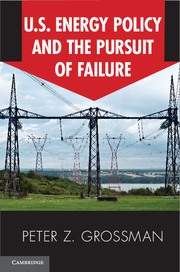1 - Crisis
Published online by Cambridge University Press: 05 March 2013
Summary
Economists may not know much. But we do know one thing very well: how to produce surpluses and shortages.…Do you want a shortage? Have the government legislate a maximum price that is below the price that would otherwise prevail.
Milton and Rose Friedman (1980, 260–1)Introduction
October 1973. That was when U.S. energy policy as it is commonly understood began. On October 17, the Arab members of the Organization of Petroleum Exporting Countries (OPEC) announced an embargo of oil against the United States and the Netherlands for their support of Israel in the 1973 Arab-Israeli Yom Kippur War. Over the ensuing weeks, the Organization of Arab Petroleum Exporting Countries’ (OAPEC) embargo led to havoc in the United States, its first national “energy crisis.” As gasoline and diesel fuel supplies dwindled, there were shortages that led to long lines of angry motorists and even angrier truckers, sitting in their vehicles in the winter cold waiting for a few gallons of fuel. The discomfort was acute and widespread. To make matters worse for consumers, when fuel was available, it was more expensive. By the end of 1973, the prices of all oil products were much higher than they had been just a few weeks earlier; there was economic “pain at the pump.” This crisis was, as a government official later observed, the first time members of America's baby-boom generation had felt real economic deprivation, and they looked to the U.S. government to “do something.”
Officials in the administration of President Richard Nixon and members of Congress promised action and soon began to introduce legislation, often the same pieces of legislation with slightly different twists. None of this legislation or any executive measures actually accomplished anything of lasting import. Still, something did change, and that was the prevailing policy narrative. Then and for the next thirty-nine years (and still counting), there was a new understanding concerning energy policy, what it was about, and what it was supposed to accomplish.
- Type
- Chapter
- Information
- US Energy Policy and the Pursuit of Failure , pp. 1 - 44Publisher: Cambridge University PressPrint publication year: 2013



